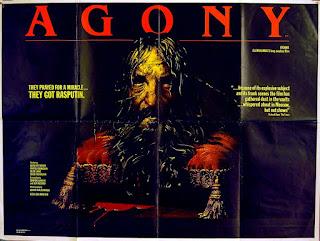
Director Elem Klimov, whose 1985 Come and See is one of the greatest anti-war films of all-time, put the finishing touches on Agony, about the influence and eventual murder of Grigori Rasputin, as far back as 1975. Soviet officials and censors, however, had a few problems with the film, so it sat on a shelf until 1981.
“In cinema, as in life”, Klimov said in a 1986 interview, “the atmosphere changes very fast. In movies, styles change fast, too. If a film is not released immediately, it soon dates. It loses its relevance to new thoughts, new ideas. If a film is not released for 10 years, it’s a real tragedy”.
The fact that Agony remained out of circulation for so many years was, indeed, a tragedy, but not the disaster it would have been had it stayed on that shelf permanently. Infusing the movie with a unique, occasionally flashy style, Klimov gives us a story of Rasputin unlike any we’ve seen before.
The year is 1916, the waning days of Imperial Russia. Grigori Rasputin (Aleksey Petrenko), a Siberian-born mystic and self-proclaimed Christian monk, has stirred up quite a bit of trouble with his role as trusted advisor to Tsar Nicholas (Anatoliy Romashin) and especially his wife, the Tsarina Aleksandra Fyodorovna (Velta Line). A drunkard and a womanizer, Rasputin was the source of a number of scandals, at one point even advising the Tsar to change military tactics in time of war, resulting in a terrible defeat for the Imperial army.
Government and religious leaders alike denounced Rasputin, but it was an assassination plot devised by several men, including Prince Felix Yusupov (Aleksandr Romanstov), Grand Duke Dmitri Pavlovich (Sergei Muchenikov), and politician Vladimir Purishkevich (Yuriy Katin-Yartsev), that finally ended Rasputin’s reign of terror. As the conspirators soon discovered, however, it would take more than poison and a few bullets to bring this “Holy Man” to his knees!
With a baroque, lively approach to the material, Klimov engages us on an emotional level throughout Agony, from anger and revulsion at Rasputin’s actions (at a party one evening, he sexually assaults a Baroness played by Nelli Pshyonnaya) to pity and a hint of admiration for Tsar Nicholas, portrayed throughout the movie as a weak but basically decent guy (one of several issues Soviet authorities had with the film). Romashin and especially Line deliver strong performances as the Tsar and Tsarina who have fallen under Rasputin’s spell, and Alisa Freindlich is also quite good as Anna, Rasputin’s cohort and chief confidante. But it is Petrenko who steals the show, playing Grigori Rasputin as a loathsome opportunist and even a sexual deviant. The Baroness he accosted at the party eventually submits to Rasputin’s sexual advances to protect her husband, who was arrested for trying to defend her honor.
Along with its cast, Agony is a stylistically engaging motion picture. Klimov brings a vivacious, almost comedic energy to a number of scenes, letting his creativity run wild at several points throughout the film, culminating in the movie’s strongest sequence: the assassination of Rasputin, depicted here in a manner that is both historically accurate and incredibly tense (much to the chagrin of his assassins, Rasputin refused to die quickly).
As with Come and See, Agony is not an easy film to watch, but you will be doing yourself a disservice if you miss either.
Rating: 9.5 out of 10
